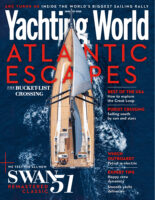Geoff West chatted to Sue Pelling about his recent Three Peaks Yacht Race win
At 2003 on Wednesday 25 June, after 4 days 4 hours and 38 minutes, Geoff West and crew the of four sailing Spirit of Barmouth – the Reflex 38 – crossed the finish line to take an overall win at the Magellan Three Peaks Yacht Race.
This gruelling race, which starts from Barmouth in Wales, covers 389 nautical miles but, unlike any other yacht race, involves cycling 30 miles and walking or running another 59 miles, taking in Snowden, Scafell Pike and Ben Nevis.
Interestingly however, despite its gruelling reputation, it seems the Three Peaks Race is not too far from the reach of the ‘ordinary’ sailor. According to West, as long as you get yourself a decent boat and a couple of good runners, anyone can do it.
West, 43, who works for AMS in Cowes as a manager making radar systems, has now won the event three times, including last year sailing the same boat. “I do it for fun, as a holiday and get a lot of pleasure from it. Okay, so you need a couple of fit runners, but as long as you have sailors who can keep the boat going at speed, that’s really all there is too it.”
Apart from West who’s from Cowes, the rest of the crew are from Barmouth, including a couple of local estate agents. “Andrew Sanderson, one of the runners, and Ian Hudson are actually rival estate agents but they get on just fine. Sanderson and Tony Hodgson, the other runner, are from the local running club so thankfully thought nothing of running up and down the mountains!” added West.
While the runners were doing their bit, the remaining three crewmembers had to navigate their way through some of the trickiest water up the coast including the Menai Strait. “I suppose,” added West, “if I had to say how the race was won it would have to be our tactics through the Sound of Islay to avoid the tidal gate. The route added five miles on to our journey, out of the Sound of Jura in to the Firth of Lorn, but with just half a knot of tide we gained 16 hours on the Dutch boat lying in second. It was funny because we were all set to blame Ian [Hudson] the navigator if it hadn’t paid off.”
With just three crew racing the boat, slotting into a rest routine was another key factor. After the first night, when West and his team had about four hours’ sleep, they went into a six hours on, three hours off routine. West continued: “In fact we had a good six hours’ sleep in Whitehaven and that was after a pint at a local pub. This is one of the few races where you can stop and have a pint (with some of the other competitors), a shower, and a good rest in the middle of the race and still win!”
As far as training for the race is concerned it seems that as long as you get a couple of really fit runners, and the crew is generally fit, there’s no real special training. West continued: “I find the best thing to do is allow the runners to concentrate on their job and give them plenty of good rest in-between their runs. As for the sailors, well, it’s a case of as much on-the-water training as possible beforehand. The important thing is to ensure you have the boat well laid out with all the control lines led back to the cockpit for short-handed sailing. Then practise spinnaker gybes with just two people on deck, as much as possible. We were also fortunate this year in having our Magellan SporTrak handheld GPS, which allowed us to do a lot of navigational chart work on deck rather than going below.”
Not surprisingly, West is keen to compete again next year to defend his title but is equally keen to encourage a few more competitors, particularly the ones that regularly beat him around the cans on the Solent. West continued: “I think if the proposed handicap system comes into place they’ll see a lot more entries. I’ve been trying to convince the organisers that one of the reasons they don’t get many entries is because the biggest, fastest boat always wins. To run the event on a Channel Handicap basis will encourage competitors to bring their own boats rather than have to charter big, flashy racers at great expense.”
And on a final note, before Team Spirit of Barmouth headed for the next whisky distillery on Islay on their way back home, West added these tips for those contemplating the race next year: “Do lots of careful planning before entering the Menai Strait – it’s important you really understand all the hazards through this part of the course. Also work with your crew to ensure you can manage the boat with just two people. Learn methods for spinnaker hoists, drops and gybes. And leave the running up to the runners!



